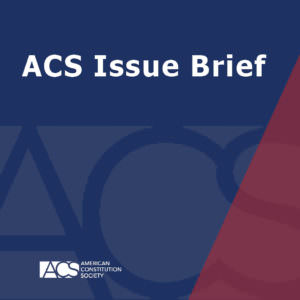Reaching Through the Schoolhouse Gate: Students' Eroding First Amendment Rights in a Cyber-Speech World
Executive Director of the Student Press Law Center
ACS is pleased to distribute an Issue Brief by Frank LoMonte, executive director of the Student Press Law Center, entitled, "Reaching Through the Schoolhouse Gate: Students' Eroding First Amendment Rights in a Cyber-Speech World." This Issue Brief is particularly timely as we mark the 40th anniversary of the Supreme Court's decision in Tinker v. Des Moines Independent Community School District, which firmly established that public school students do not "shed their constitutional rights to freedom of speech or expression at the schoolhouse gate." Mr. LoMonte argues, though, that the internet and technology are testing this fundamental principle in ways that we should resist so that we do not inflict damage on the First Amendment.
Mr. LoMonte discusses recent developments in the law of online speech that he believes are headed toward the point where "students do not enjoy - anywhere, anytime - the same right to comment on school events as ordinary citizens." He contends that, under recent cases, "so long as the impact of students' words may foreseeably reach school grounds, courts are increasingly willing to tolerate school punishment for the content of online speech that would enjoy full First Amendment protection if written by anyone not enrolled in school." Mr. LoMonte concludes that these developments, coupled with our new electronic means of communicating, have endangered the traditional sanctuary for students who could not speak at school - speaking or publishing off campus after hours - because modern communications can easily find their way onto campus during the school day. He argues that this trend in the law has the effect of stifling student speech, especially the discussion of any topic that may tend toward dissent or controversy, as well as imposing burdens on students who may already be marginalized.
In his Issue Brief, Mr. LoMonte points out that we only have one First Amendment, and urges that we not undermine its protections when addressing the challenges posed by technology. We have entered a new and exciting era with the growth of online speech, and he argues that we must also be mindful of the implications of our decisions regarding student speech for other aspects of our fundamental rights. Whenever possible, he suggests, we should turn first to long established methods of addressing any problems that arise before we consider fundamental changes to the law. He observes, "Once First Amendment rights are lost, they seldom are recovered because people who cannot speak cannot arouse support. The loss often is incremental, with each descending stair step becoming 'the new normal,' and so this latest incursion on young people's rights must be viewed in the larger context of decades of dangerous retrenchment."
Read the full Issue Brief here: Reaching Through the Schoolhouse Gate: Students' Eroding First Amendment Rights in a Cyber-Speech World

